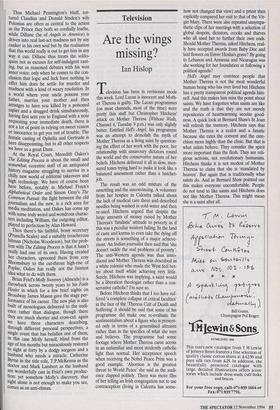Television
Are the wings missing?
Ian Hislop
television has been in revisionist mode this week. Lord Lucan is innocent and Moth- er Theresa is guilty. The Lucan programmes (on most channels, most of the time) were pretty thin stuff but Christopher Hitchens' attack on Mother Theresa (Without Walls, Channel 4, Tuesday 9 p.m.) was only slightly better. Entitled Hell's Angel his programme was an attempt to demolish the myth of Mother Theresa as a living saint by question- ing the effect of her work with the poor, her relationship with unsavoury dictators round the world and the conservative nature of her beliefs. Hitchens delivered it all in slow, mea- sured tones trying hard to make it look like a balanced assessment rather than a hatchet- job. The result was an odd mixture of the unsettling and the unconvincing. A volunteer from her hospice in Calcutta talked about the lack of medical care there and described needles being washed in cold water and then re-used. Hitchens argued that despite the large amounts of money raised by Mother Theresa's 'fatalistic' attitude to poverty as if this was a peculiar western failing. In the land of caste and karma to even take the dying off the streets is something of a major achieve- ment. An Indian journalist then said that 'she doesn't tackle the real problems of poverty'. The anti-Western agenda was thus intro- duced and Mother Theresa was described as a white colonist who made the West feel bet- ter about itself whilst achieving very little. Surely, Hitchens was implying, a saint would be a liberation theologist rather than a con- servative catholic? I'm sure so.
Before Hitchens thinks that I too have suf- fered 'a complete collapse of critical faculties' in the face of the 'Theresa Cult of Death and Suffering' it should be said that some of his programme did make one re-evaluate the sentimentalism about a figure who is present- ed only in terms of a generalised altruism rather than in the specifics of what she says and believes. The programme had some footage where Mother Theresa came across in an unfamiliar and more stridently catholic light than normal. Her acceptance speech when receiving the Nobel Peace Prize was a good example. 'Abortion is the greatest threat to World Peace' she said as the audi- ence clapped politely. There was more film of her telling an Irish congregation not to use contraception (living in Calcutta has some- how not changed this view) and a priest then explicitly compared her visit to that of the Vir- gin Mary. There were also repeated unsympa- thetic clips of her meetings with a selection of global despots, dictators, crooks and thieves who all used her to further their own ends. Should Mother Theresa, asked Hitchens, real- ly have accepted awards from Baby Doc and laid flowers on Enver Hoxha's grave? By going to Lebanon and Armenia and Nicaragua was she working for her foundation or following a political agenda?
Hell's Angel may convince people that Mother Theresa is not the most wonderful human being who has ever lived but Hitchens has a pretty transparent political agenda him- self. And this makes him miss the point about saints. We have forgotten what saints are like and the truth is that they are not merely repositories of heartwarming secular good- ness. A quick look at Bernard Shaw's St Joan will refresh the memory. Hitchens says that Mother Theresa is a zealot and a fanatic because she rates the convent and the cate- chism more highly than the clinic. But that is what saints believe. They consider the spirit more important than the flesh. They are reli- gious activists, not revolutionary humanists. Hitchens thinks it is not modest of Mother Theresa to claim that she is 'mandated by heaven'. But again that is traditionally what saints do. And as Bernard Shaw pointed out this makes everyone uncomfortable. People do not tend to like saints and Hitchens does not like Mother Theresa. This might mean she is a saint after all.


































































 Previous page
Previous page